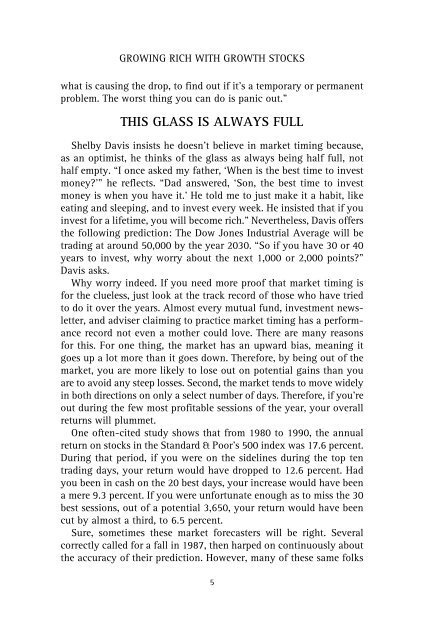You also want an ePaper? Increase the reach of your titles
YUMPU automatically turns print PDFs into web optimized ePapers that Google loves.
GROWING RICH WITH GROWTH STOCKS<br />
what is causing the drop, to find out if it’s a temporary or permanent<br />
problem. The worst thing you can do is panic out.”<br />
THIS GLASS IS ALWAYS FULL<br />
Shelby Davis insists he doesn’t believe in market timing because,<br />
as an optimist, he thinks of the glass as always being half full, not<br />
half empty. “I once asked my father, ‘When is the best time to invest<br />
money?’” he reflects. “Dad answered, ‘Son, the best time to invest<br />
money is when you have it.’ He told me to just make it a habit, like<br />
eating and sleeping, and to invest every week. He insisted that if you<br />
invest for a lifetime, you will be<strong>com</strong>e rich.” Nevertheless, Davis offers<br />
the following prediction: The Dow Jones Industrial Average will be<br />
trading at around 50,000 by the year 2030. “So if you have 30 or 40<br />
years to invest, why worry about the next 1,000 or 2,000 points?”<br />
Davis asks.<br />
Why worry indeed. If you need more proof that market timing is<br />
for the clueless, just look at the track record of those who have tried<br />
to do it over the years. Almost every mutual fund, investment newsletter,<br />
and adviser claiming to practice market timing has a performance<br />
record not even a mother could love. There are many reasons<br />
for this. For one thing, the market has an upward bias, meaning it<br />
goes up a lot more than it goes down. Therefore, by being out of the<br />
market, you are more likely to lose out on potential gains than you<br />
are to avoid any steep losses. Second, the market tends to move widely<br />
in both directions on only a select number of days. Therefore, if you’re<br />
out during the few most profitable sessions of the year, your overall<br />
returns will plummet.<br />
One often-cited study shows that from 1980 to 1990, the annual<br />
return on stocks in the Standard & Poor’s 500 index was 17.6 percent.<br />
During that period, if you were on the sidelines during the top ten<br />
trading days, your return would have dropped to 12.6 percent. Had<br />
you been in cash on the 20 best days, your increase would have been<br />
a mere 9.3 percent. If you were unfortunate enough as to miss the 30<br />
best sessions, out of a potential 3,650, your return would have been<br />
cut by almost a third, to 6.5 percent.<br />
Sure, sometimes these market forecasters will be right. Several<br />
correctly called for a fall in 1987, then harped on continuously about<br />
the accuracy of their prediction. However, many of these same folks<br />
5










